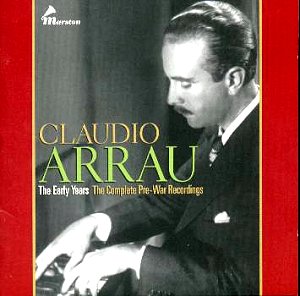Marston has rectified a serious omission in Claudio
Arrau’s (1903-1991) discography by compiling, in a slimline double CD
set, his complete pre-War recordings. Much has previously, if rather
haphazardly, been available on Dante, EMI and on Pearl amongst others
but the earliest recordings, for Aeolian Vocalion, made in 1921 have
seldom since seen the light of day. He made this brace of discs as an
eighteen year old in London, a situation doubtless engineered as a result
of his recent London debut, playing of all things the Goldberg Variations,
on the same bill as Nellie Melba. The straight talking Australian characteristically
objected when the young pianist received too much applause. But his
career really took off when he won the Geneva piano Competition in 1927
– jurors Cortot, Rubinstein, da Motta, and Pembauer – and then the Martin
Krause pupil began a lengthy series of recordings in Germany for Polydor.
The very first recordings he made – of the Chopin Waltz
in F and the Schubert Moment Musical – make an interesting contrast;
the former is attractive though hardly startling but the latter very
deliberate, with far too many youthfully forced rubati. Seven years
later, at the age of twenty-five, he was recording for Polydor in Berlin.
The Paganini-Liszt Etudes are full of operatic impress and drama but
his Islamey teems with lashing virtuosity and has some dazzling moments.
The remake of the same Chopin Waltz he’d already recorded in London
in 1921 is good, brisk but a little garbled at the climax. The C sharp
minor Etude is again an example of his not unfeeling but certainly strongly
etched Chopin playing whilst the remake a year later – issued in a disc
containing three Etudes and a Prelude - is better still; fast certainly
but full of the most acute structural control and clarity. The Prelude
in F is beautifully poetic and the Etude in E (Op 10/3) similarly distinguished
in its tonal production.
The second disc starts in 1928 – the discs are broadly
but not absolutely chronological because the previous recordings were
all waxed in a series dating from January 1929. Liszt, Chopin and Schumann
are the composers represented in this decade’s worth of discs with a
couple of pieces by Debussy as well. Les jeux d’eaux à la Villa
d’Este is vividly played; the sense of animation is visceral and the
wide frequency range, thankfully unattenuated by Ward Marston, allows
one to appreciate Arrau’s mastery of tonal gradation. The Rapsodie espagnole
is abridged but still powerful and virtuosic. His Chopin Etude in F
Op 10 No 8 is effortlessly quick but questionably effective. As for
the recording of Schumann’s Carnaval, made on 3-4 April 1939, I have
very mixed feelings. The Préamble is very combustible with tempo
extremes built in, Pierrot choppy and mannered, like a hobbled march.
Arlequin by contrast is simply too fast and unstable for comfort. I
liked the Valse noble but Eusebius – what was Arrau thinking of? – is
indolent and woefully undercharacterised. He does seem from here on
to respond rather better but there are still as many ups as there are
downs. Papillons is rushed through, Chiarina over excited with hyper-rubati
that simply call attention to themselves, whereas Chopin is quite beautiful.
Paganini is expertly judged, not too much showing off, Promenade fine
and if he uses less pedal than seems to me ideal in the final Davidsbündler
movement it’s still a fine ending. His Debussy is generally underestimated;
the 1939 recording labelled Danse (actually it’s the Tarantelle styrienne)
has the most delicate tracery and gorgeous tone and Jardins sous la
pluie is not far behind in its tonal effulgence; marvellous playing.
The programme ends with two good but not elite performances of more
Chopin, the A flat Ballade and C sharp minor Scherzo.
The recordings are highly successful; fidelity and
sensitivity have been exercised. The documentary notes have full recording
details and biographical and other material written by Jed Distler.
No Arrau admirer would want to be without it.
Jonathan Woolf


